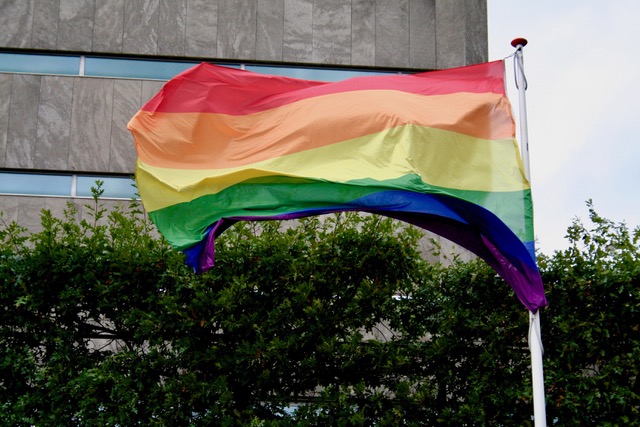‘Coming Out Day is in a transitional phase’
-
 Foto: Antonia Leise
Foto: Antonia Leise
Tomorrow, the rainbow flag will again be raised proudly in front of the Erasmus building. Dito! chairman Daan Janssen about why his organisation chooses to again organise activities around International Coming Out Day and about its changing character.
This year, Coming Out Day falls right in the middle of Radboud University’s Well-Being Week. It’s a coincidence, but it is fitting, thinks Daan Janssen, the chairman of LGBT+ youth organisation Dito! ‘The numbers show that the LGBT youth still deals with depression and suicidal thoughts a lot more often than other young people’, he says. ‘It can be very lonely to grow up with the idea that you are different.’
The coming out is still an important topic, Janssen thinks. ‘It is absolutely not true that coming out has become unnecessary. As long as being straight, or behaving ‘according to your sex’ is still the norm, you will be forced at some point to say that you fall outside that norm’, he says. ‘Coming Out Day, historically, is a good moment to be open, to show your colours. But the moment of the coming out is just the beginning of the process of self identification. That goes on for life.’
Partially because of that, some people are critical of the name ‘Coming Out Day’, he knows. ‘I understand, the coming out is definitely not the most important moment in the life of a person in the LGBT community, the constant focus on the coming out is a bit unfortunate. But only by explicitly coming out and being open about your sexuality or gender identity, makes you visible as a minority. Without visibility, there will be no acceptance and that way, it will never be considered normal.’
Jealous
Coming Out Day emerged from the Second National March on Washington for Lesbian and Gay Rights, on the 11th of October 1987. The year after, on the same date, the first edition of Coming Out Day was celebrated, as a day of protest and also to celebrate the act of coming out. It was picked up by the Human Rights Council and in 2009, it also reached The Netherlands. The day does not have a central organisation here, municipalities have to pick it up themselves. ‘I am very thankful that the city of Nijmegen makes a programme every year, together with a big group of organisations’, says Janssen. ‘The city also stimulates activities in all schools. When I see the information that young people in Nijmegen have access to, I am almost jealous. Teachers are involved in the topic, it wasn’t like that in my school days.’
‘In my school days teachers weren’t involved in the topic’
Coming Out Day is going through a transition phase, says Janssen. ‘The situation is completely different from thirty years ago, luckily. That does not mean that this battle will have been fought in a couple of years, but for many people, coming out of the closet comes with less fear and insecurity for many people.’ According to him, the day is evolving into a day to stimulate more conversation between LGBT people and the rest of the world. ‘It’s a good thing that the focus moves from the coming out a little’, Janssen thinks.
Tonight, Dito! organises a screening of the new NPO series Anne+, about the love life of Anne, who is a lesbian. Tomorrow, Dito! will publish coming out stories online.



